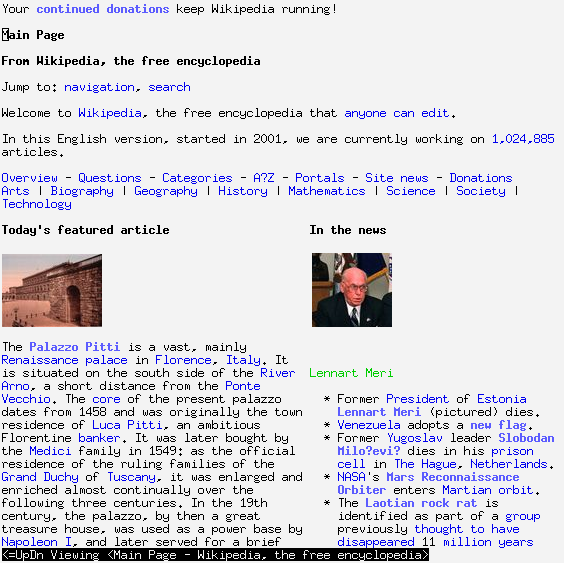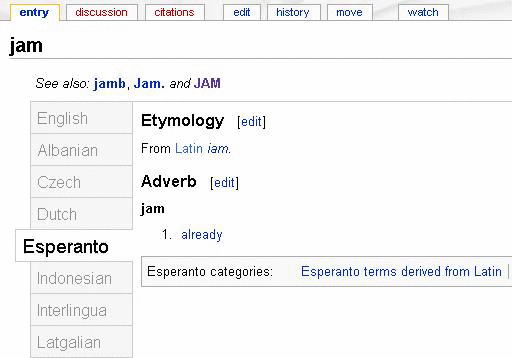|
ELinks
ELinks is a free text-based web browser for Unix-like operating systems. It began in late 2001 as an experimental fork by Petr Baudiš of the Links Web browser, hence the E in the name. Since then, the E has come to stand for Enhanced or Extended. On 1 September 2004, Baudiš handed maintainership of the project over to Danish developer Jonas Fonseca, citing a lack of time and interest and a desire to spend more time coding rather than reviewing and organising releases. On 17 March 2017, OpenBSD removed ELinks from its ports tree, citing concerns with security issues and lack of responsiveness from the developers. On 17 November 2017, ELinks was forked into another program called felinks meaning ''forked elinks''. It is being actively maintained with the latest version at 0.15.0 dated 24 December 2021. Features * HTTP and Proxy authentication * Persistent HTTP cookies * Support for browser scripting in Perl, Ruby, Lua and GNU Guile * Tabs (though still text mode) * HTML t ... [...More Info...] [...Related Items...] OR: [Wikipedia] [Google] [Baidu] |
Links (web Browser)
Links is a free software text and graphical web browser with a pull-down menu system. It renders complex pages, has partial HTML 4.0 support (including tables and frames and support for multiple character sets such as UTF-8), supports color and monochrome terminals, and allows horizontal scrolling. It is intended for users who want to retain many typical elements of graphical user interfaces (pop-up windows, menus etc.) in a text-only environment. The original version of Links was developed by Mikuláš Patočka in the Czech Republic. His group ''Twibright Labs'' later developed version 2 of the Links browser, which displays graphics, and renders fonts in different sizes (with spatial anti-aliasing), but no longer supports JavaScript (it used to, up to version 2.1pre28). The resulting browser is very fast, but does not display many pages as intended. The graphical mode works even on Unix systems without the X Window System or any other window environment, using either SVGAlib o ... [...More Info...] [...Related Items...] OR: [Wikipedia] [Google] [Baidu] |
Text-based Web Browser
A text-based web browser is a web browser that renders only the text of web pages, and ignores most graphic content. Under small bandwidth connections, usually, they render pages faster than graphical web browsers due to lowered bandwidth demands. Additionally, the greater CSS, JavaScript and typography functionality of graphical browsers require more CPU resources. They also can be heavily modified to display certain content differently Text-based browsers are often very useful for users with visual impairment or partial blindness. They are especially useful with speech synthesis or text-to-speech software, which reads content to users. Progressive enhancement allows a site to be compatible with text-based web browsers without compromising functionality to more sophisticated browsers, as the content is readable through pure HTML without CSS or JavaScript. List of notable text-based web browsers *browsh *Charlotte Web Browser (for VM/CMS) *Emacs/W3 & EWW for GNU Emacs * Line ... [...More Info...] [...Related Items...] OR: [Wikipedia] [Google] [Baidu] |
C (programming Language)
C (''pronounced like the letter c'') is a General-purpose language, general-purpose computer programming language. It was created in the 1970s by Dennis Ritchie, and remains very widely used and influential. By design, C's features cleanly reflect the capabilities of the targeted CPUs. It has found lasting use in operating systems, device drivers, protocol stacks, though decreasingly for application software. C is commonly used on computer architectures that range from the largest supercomputers to the smallest microcontrollers and embedded systems. A successor to the programming language B (programming language), B, C was originally developed at Bell Labs by Ritchie between 1972 and 1973 to construct utilities running on Unix. It was applied to re-implementing the kernel of the Unix operating system. During the 1980s, C gradually gained popularity. It has become one of the measuring programming language popularity, most widely used programming languages, with C compilers avail ... [...More Info...] [...Related Items...] OR: [Wikipedia] [Google] [Baidu] |
OpenBSD
OpenBSD is a security-focused operating system, security-focused, free and open-source, Unix-like operating system based on the Berkeley Software Distribution (BSD). Theo de Raadt created OpenBSD in 1995 by fork (software development), forking NetBSD 1.0. According to the website, the OpenBSD project emphasizes "portability, standardization, correctness, proactive security and integrated cryptography." The OpenBSD project maintains software portability, portable versions of many subsystems as package manager, packages for other operating systems. Because of the project's preferred BSD license, many components are reused in proprietary and corporate-sponsored software projects. The firewall (computing), firewall code in Apple Inc., Apple's macOS is based on OpenBSD's PF (firewall), PF firewall code, Android (operating system), Android's Bionic (software), Bionic C standard library is based on OpenBSD code, LLVM uses OpenBSD's regular expression library, and Windows 10 uses OpenSSH ... [...More Info...] [...Related Items...] OR: [Wikipedia] [Google] [Baidu] |
HTTP Cookie
HTTP cookies (also called web cookies, Internet cookies, browser cookies, or simply cookies) are small blocks of data created by a web server while a user is browsing a website and placed on the user's computer or other device by the user's web browser. Cookies are placed on the device used to access a website, and more than one cookie may be placed on a user's device during a session. Cookies serve useful and sometimes essential functions on the web. They enable web servers to store stateful information (such as items added in the shopping cart in an online store) on the user's device or to track the user's browsing activity (including clicking particular buttons, logging in, or recording which pages were visited in the past). They can also be used to save for subsequent use information that the user previously entered into form fields, such as names, addresses, passwords, and payment card numbers. Authentication cookies are commonly used by web servers to authentic ... [...More Info...] [...Related Items...] OR: [Wikipedia] [Google] [Baidu] |
Perl
Perl is a family of two High-level programming language, high-level, General-purpose programming language, general-purpose, Interpreter (computing), interpreted, dynamic programming languages. "Perl" refers to Perl 5, but from 2000 to 2019 it also referred to its redesigned "sister language", Perl 6, before the latter's name was officially changed to Raku (programming language), Raku in October 2019. Though Perl is not officially an acronym, there are various backronyms in use, including "Practical Data extraction, Extraction and Reporting Language". Perl was developed by Larry Wall in 1987 as a general-purpose Unix scripting language to make report processing easier. Since then, it has undergone many changes and revisions. Raku, which began as a redesign of Perl 5 in 2000, eventually evolved into a separate language. Both languages continue to be developed independently by different development teams and liberally borrow ideas from each other. The Perl languages borrow featur ... [...More Info...] [...Related Items...] OR: [Wikipedia] [Google] [Baidu] |
Ruby (programming Language)
Ruby is an interpreted, high-level, general-purpose programming language which supports multiple programming paradigms. It was designed with an emphasis on programming productivity and simplicity. In Ruby, everything is an object, including primitive data types. It was developed in the mid-1990s by Yukihiro "Matz" Matsumoto in Japan. Ruby is dynamically typed and uses garbage collection and just-in-time compilation. It supports multiple programming paradigms, including procedural, object-oriented, and functional programming. According to the creator, Ruby was influenced by Perl, Smalltalk, Eiffel, Ada, BASIC, Java and Lisp. History Early concept Matsumoto has said that Ruby was conceived in 1993. In a 1999 post to the ''ruby-talk'' mailing list, he describes some of his early ideas about the language: Matsumoto describes the design of Ruby as being like a simple Lisp language at its core, with an object system like that of Smalltalk, blocks inspired by highe ... [...More Info...] [...Related Items...] OR: [Wikipedia] [Google] [Baidu] |
GNU Guile
GNU Ubiquitous Intelligent Language for Extensions (GNU Guile) is the preferred extension language system for the GNU Project and features an implementation of the programming language Scheme. Its first version was released in 1993. In addition to large parts of Scheme standards, Guile Scheme includes modularized extensions for many different programming tasks. For extending programs, Guile offers ''libguile'' which allows the language to be embedded in other programs, and integrated closely through the C language application programming interface (API); similarly, new data types and subroutines defined through the C API can be made available as extensions to Guile. Guile is used in programs such as GnuCash, LilyPond, GNU Guix, GNU Debugger, GNU TeXmacs anGoogle's schism Guile Scheme Guile Scheme is a general-purpose, high-level programming language whose flexibility allows expressing concepts in fewer lines of code than would be possible in languages such as C. For ... [...More Info...] [...Related Items...] OR: [Wikipedia] [Google] [Baidu] |
Lua (programming Language)
Lua ( ; from meaning ''moon'') is a lightweight, high-level, multi-paradigm programming language designed primarily for embedded use in applications. Lua is cross-platform, since the interpreter of compiled bytecode is written in ANSI C, and Lua has a relatively simple C API to embed it into applications. Lua originated in 1993 as a language for extending software applications to meet the increasing demand for customization at the time. It provided the basic facilities of most procedural programming languages, but more complicated or domain-specific features were not included; rather, it included mechanisms for extending the language, allowing programmers to implement such features. As Lua was intended to be a general embeddable extension language, the designers of Lua focused on improving its speed, portability, extensibility, and ease-of-use in development. History Lua was created in 1993 by Roberto Ierusalimschy, Luiz Henrique de Figueiredo, and Waldemar Celes, ... [...More Info...] [...Related Items...] OR: [Wikipedia] [Google] [Baidu] |
Linux Journal
''Linux Journal'' (''LJ'') is an American monthly technology magazine originally published by Specialized System Consultants, Inc. (SSC) in Seattle, Washington since 1994. In December 2006 the publisher changed to Belltown Media, Inc. in Houston, Texas. Since 2017, the publisher was Linux Journal, LLC. located in Denver, Colorado. The magazine focused specifically on Linux, allowing the content to be a highly specialized source of information for open source enthusiasts. The magazine was published from March 1994 to August 2019, over 25 years, before being bought by Slashdot Media in 2020. History ''Linux Journal'' was the first magazine to be published about the Linux kernel and operating systems based on it. It was established in 1994. The first issue was published in March 1994 by Phil Hughes and Bob Young, who later co-founded Red Hat, and it featured an interview with Linux creator Linus Torvalds. The publication's last print edition was August 2011, issue 208. Beginni ... [...More Info...] [...Related Items...] OR: [Wikipedia] [Google] [Baidu] |
Tab (GUI)
In interface design, a tab is a graphical user interface object that allows multiple documents or panels to be contained within a single window, using tabs as a navigational widget for switching between sets of documents. It is an interface style most commonly associated with web browsers, web applications, text editors, and preference panes, with window managers, especially tiling window managers, being lesser known examples. Tabs are modeled after traditional card tabs inserted in paper files or card indexes (in keeping with the desktop metaphor). Tabs may appear in a horizontal bar or as a vertical list, of which the former takes typically less screen space whereas the latter can show more items at once while still having space for individual titles. Horizontal tabs may have multiple rows. Tabs may be organizable by changing their order through drag and drop or creating a separate window from an existing tab. Implementations may support range-selecting multiple tabs f ... [...More Info...] [...Related Items...] OR: [Wikipedia] [Google] [Baidu] |




